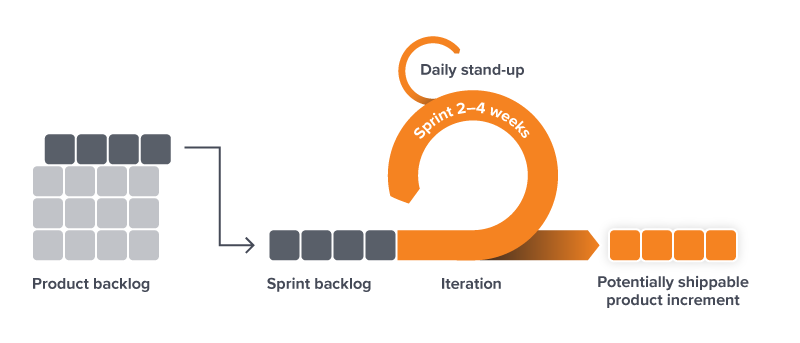Scrum and Organizational Success
Are you curious about the relationship between organizational performance and Scrum?
Scrum has always been a part of Sesame’s service offering, since it allows us to best serve our clients, and thus we’re happy to discuss Scrum with you more. In this article, we’ll look at the Scrum development framework and its organization-wide deployment. When you’re ready to manage your process using Scrum, check out this article for our insight on real world example on how scrum helps you to manage your workflow.
Now we are explaining the real-world example of the implementation of scrum in an organization.
Implementation of Scrum in an organization
Before starting the first Sprint
Usama is excited to be a Scrum Product Owner. He’s been tasked with starting requirement engineering for his first project and wants it done right! After some brainstorming, Usama decides on writing down all essential use cases in Scrum Product Backlog and discussing them with architects so they can start thinking about what will work best in their designs. Next, he initiates an estimation session where different groups come together, such as customer representatives or senior developers, critical stakeholders. These represent crucial aspects need to be addressed in any developing software solution.
The Scrum Product Owner is now ready for the next step in his journey. As a result of this session, we estimated all the backlog items and prioritized them by importance so that they can be broken down into smaller stories before being scheduled to work within sprints with other team members as part of an upcoming planning meeting!

Sprint 1 – Day 0
Usama presents the Scrum Product Backlog items from high to low priority at the Sprint Planning meeting. The team responds to unanswered questions and identifies whether they have the ability, requisite knowledge, and other necessary resources for each task. The participants promise to finish Stories 1, 2, 3, 6, 7, and 8 before the conclusion of the Sprint. We can not achieve Items 4 and 5 in this Sprint because certain technical facilities have not yet been implemented.
Once the sprint planning meeting ends, Abel – the team’s Scrum Master – gathers the team to talk about how we will execute the agreed-upon tasks. All the tasks arising from the meeting are on the Sprint Task board, created beforehand. Once the team members choose a job, they begin working on it.
Sprint 1 – Day 1
The whole team gathers in the morning for their Daily Scrum Meeting. Everyone summarizes what has been accomplished so far, updates the estimated number of hours left on the Sprint Taskboard cards. It also describes what they intend to complete today, and mentions any obstacles to continuing their work. Today, one of the team members expresses his dissatisfaction with his current situation since he needs a new license for one of the software products he employs. Abel asks if other team members are experiencing the same issue and says he’ll take care of it after the meeting. Everyone returns to work after 15 minutes.
Following the meeting, Abel provides an update on the Sprint Burndown. Then he contacts the tool’s software provider, places an order for licenses, and distributes them to those who need them.
Sprint 1 – Day 2
The whole team meets again in the morning for their Daily Scrum meeting. One of the Scrum team members is uncertain about the specifics of one of the user stories in the afternoon. He contacts Usama, the Scrum Product Owner, and they talk about the issues. After the team member has determined what to accomplish, he may go forward with his implementation.
Sprint 1 – Day 28
Abel –Scrum Master– welcomed the team to their first Sprint Review meeting, and it was the last day of the first Sprint. The program has been integrated into the machine. The Scrum Product Owner, Usama – who sits in front of the machine – examines the features to make sure they match his expectations and fulfill all the requirements. He writes in the summary of the session:
- Stories 1, 2, 6, and 7 completes on schedule.
- The story 3 fails to complete on time.
- Story 8 needs minor refactoring.
Story 3 failed since the requirements were unclear and the work required the division of responsibilities, the project was delayed. However, it was a valuable lesson learned for the team’s future success.
The team conducts the Sprint Retrospective Meeting in the afternoon to talk about what went well and improved throughout the Sprint. One of the comments received is that the team feels that they lack understanding of the system architecture. Abel volunteers to make the introductions by inviting the system architect to provide a more thorough overview.
Sprint 2 – Day 1
Based on his previous client interactions, Usama – Scrum Product Owner – adds new items to the Scrum Product Backlog. In addition, he provides more things for narrative 8’s refactoring. Usama then invites the team to the Sprint 2 Sprint Planning Meeting. The group meets with Abel, the Scrum Master, to discuss and commit to stories, and the second Sprint starts.



